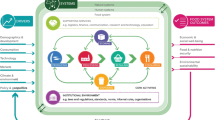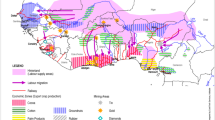Abstract
Research consistently shows the typical farmers market shopper is a white, affluent, well-educated woman. While some research to date examining farmers markets discusses the exclusionary aspects of farmers markets, little has expounded on this portrait of the typical shopper. As a result of this neglect, the potential of farmers markets to be an inclusive, sustainable development tool remains hindered. This study seeks to better understand this typical shopper by drawing upon anti-consumerism literature to examine the motivations of these shoppers. Findings from a survey of 390 shoppers in a predominately Hispanic community are discussed. Results from the survey indicate that even in a community in which white, non-Hispanics are the minority, the farmers market shopper is likely to be a white, non-Hispanic female who is more affluent and well educated than the average community member. Theoretical implications and suggestions for those working in community development are discussed. Suggestions for future research are also provided.
Similar content being viewed by others
References
Adams, D.C., and A.E. Adams. 2011. De-placing local at the farmer’s market: Consumer conceptions of local foods. Journal of Rural Social Sciences 26(2): 74–100.
Adams, D.C., and M.J. Salois. 2010. Local versus organic: The turn in consumer preferences and willingness to pay. Renewable Agriculture and Food Systems 25: 331–341.
Alkon, A. 2008. Paradise or pavement: The social construction of the environment in two urban farmers’ markets and their implications for environmental justice and sustainability. Local Environment 13(3): 271–289.
Andreatta, S., and W. Wickliffe II. 2002. Managing farmer and consumer expectations: A study of a North Carolina farmers market. Human Organization 61(2): 167–176.
Barnett, C., P. Cafaro, and T. Newholm. 2005. Philosophy and ethical consumption. In The ethical consumer, ed. R. Harrison, T. Newholm, and D. Shaw, 11–24. Thousand Oaks, CA: Sage Publications.
Bauman, Z. 2000. Liquid modernity. Malden, MA: Polity Press.
Bauman, Z. 2007a. Consuming life. Malden, MA: Polity Press.
Bauman, Z. 2007b. Liquid times: Living in an age of uncertainty. Malden, MA: Polity Press.
Beck, U. 1992. Risk society: Towards a new modernity. Thousand Oaks, CA: Sage Publications.
Beck, U. 1994. The reinvention of politics: Towards a theory of reflexive modernization. In Reflexive modernization: Politics, tradition and aesthetics in the modern social order, ed. U. Beck, A. Giddens, and S. Lash, 1–55. Stanford, CA: Stanford University Press.
Beck, U. 2009. World at risk. Malden, MA: Polity Press.
Binkley, S. 2008. Liquid consumption: Anti-consumerism and the fetishized defetishization of commodities. Cultural Studies 22(5): 599–623.
Binkley, S., and J. Littler. 2008. Cultural studies and anti-consumerism: A critical encounter. Cultural Studies 22(5): 519–530.
Bubinas, K. 2011. Farmers markets in the post-industrial city. City and Society 23(2): 154–172.
Cheong, P.H. 2006. Communication context, social cohesion and social capital building. Community, Work, and Family 9(3): 367–387.
Cheong, P.H., H.A. Wilkin, and S.J. Ball-Rokeach. 2004. Diagnosing the communication infrastructure in order to reach target audiences: A study of Hispanic communities in Los Angeles. In Understanding health communication technologies, ed. P. Whitten, and D. Cook, 101–110. San Francisco, CA: Jossey-Bass.
Crowley, D. 2005. Social capitalism begins at home. National Civic Review 94(4): 39–43. (add full reference).
Eastwood, D.B. 1996. Using customer surveys to promote farmers markets: A case study. Journal of Food Distribution 27(3): 23–30.
Gasteyer, S., S.A. Hultine, L.R. Cooperband, and M.P. Curry. 2008. Produce sections, town squares, and farm stands: Comparing local food systems in community context. Southern Rural Sociology 23(1): 47–71.
Giddens, A. 1994. Beyond left and right: The future of radical politics. Stanford, CA: Stanford University Press.
Gilbert, J. 2008. Against the commodification of everything: Anti-consumerist cultural studies in the age of ecological crisis. Cultural Studies 22(5): 551–566.
Harvey, D. 2005. A brief history of neoliberalism. New York: Oxford University Press.
Holloway, L., and M. Kneafsey. 2000. Reading the space of the farmers’ market: A preliminary investigation from the U.K. Sociologia Ruralis 40: 285–299.
Jurik, N.C., G. Cavender, and J. Cowgill. 2006. Searching for social capital in U.S. microenterprise development programs. Journal of Sociology & Social Welfare 33(3): 151–170.
Lash, S., and B. Wynne. 1992. Introduction. In Risk society: Towards a new modernity, ed. U. Beck, 1–8. Thousand Oaks: Sage Publications.
Micheletti, M. 2003. Individuals, consumerism, and collective action. New York: Palgrave Macmillan.
Micheletti, M. 2004. Why more women? Issues of gender and political consumerism. In Politics, products, and markets: Exploring political consumerism past and present, ed. M. Micheletti, A. Føllesdal, and D. Stolle, 245–264. New Brunswick, NJ: Transaction Publishers.
Micheletti, M., and D. Stolle. 2008. Fashioning social justice through political consumerism, capitalism, and the Internet. Cultural Studies 22(5): 749–769.
Moliter, et al. 2011. Increasing social capital and personal efficacy through small-scale community events. Journal of Community Psychology 39(6): 749–754.
Payne, T. 2002. U.S. farmers markets 2000: A study of emerging trends. USDA: Washington D.C.
Pilgeram, R. 2012. Social sustainability and the white, nuclear family: Constructions of gender, race, and class at a northwest farmers market. Race, Gender and Class 19(1–2): 37–60.
United States Census Bureau (USCB). 2010. State & County QuickFacts. Washington, DC: U.S. Department of Commerce. http://quickfacts.census.gov/qfd/index.html. Accessed 1 Nov 2013.
Author information
Authors and Affiliations
Corresponding author
Rights and permissions
About this article
Cite this article
Rice, J.S. Privilege and exclusion at the farmers market: findings from a survey of shoppers. Agric Hum Values 32, 21–29 (2015). https://doi.org/10.1007/s10460-014-9513-7
Accepted:
Published:
Issue Date:
DOI: https://doi.org/10.1007/s10460-014-9513-7




